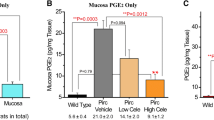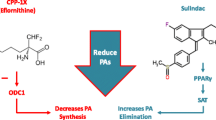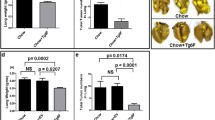Abstract
Mutations of the adenomatous polyposis coli (APC) gene are implicated early in colorectal tumorigenesis. Restoration of normal APC expression through gene therapy may prevent or reduce intestinal neoplasia. Furthermore, the relationship between colorectal tumors and increased cyclooxygenase-2 (COX-2) activity provides a rationale for the use of selective COX-2 inhibitors such as rofecoxib (Vioxx) to prevent the formation of polyps. This study was performed to determine the effects of liposome-mediated APC gene therapy and a selective COX-2 inhibitor on intestinal neoplasia in vivo. Five-week-old Min mice weaned on a 30% high-fat diet were randomized to receive no treatment (control), APC only, Vioxx only, and APC/Vioxx. APC-treated mice received a plasmid containing the human APC cDNA (pCMV-APC) mixed with a liposome preparation that was administered biweekly. Vioxx was administered at 200 ppm in the high-fat rodent chow. The control mice were treated similarly with a plasmid construct lacking the APC gene. Confirmation of exogenous APC gene expression was determined by Western blot analysis. After 2 months, there was a 54% and 70% reduction in the total number of intestinal polyps after APC and Vioxx treatment, respectively. Combined APC/Vioxx therapy reduced polyp formation by 87%. The reduction of intestinal neoplasia by APC gene replacement and COX-2 inhibition suggests their separate roles in intestinal tumorigenesis. Each modality, both individually and together, may prove therapeutic and therefore contribute to new strategies in the prevention and treatment of colorectal cancer.
Similar content being viewed by others
References
Vogelstein B, Fearon ER, Hamilton SR, Kern SE, Preisinger AC, Leppert M, Nakumura Y, White R, Smits AMM, Bos JL. Genetic alterations during colorectal-tumor development. N Engl J Med 1988;319:525–532.
Kinzler KW, Nilbert MC, Su L-K, Vogelstein B, Bryan TM, Levy DB, Smith KJ, Preisinger AC, Hedge P, Mc- Kechnie D, Finniear R, Markham A, Groffen J, Boguski M, Altschul S, Horii A, Ando H, Miyoshi Y, Miki Y, Nishisho I, Nakamura Y. Identification of the FAP locus genes from chromosome 5q21. Science 1991;253:661–665.
Powell SM, Zilz N, Beazer-Barclay Y, Bryan TM, Hamilton SR, Thibodeau SN, Vogelstein B, Kinzler KW. APC mutations occur early during colorectal tumorigenesis. Nature 1991;359:235–237.
Nishisho I, Nakamura Y, Miyoshi Y, Miki Y, Ando H, Horii A, Koyama K, Utsunomiya J, Baba S, Hedge P, Markham A, Krush AJ, Petersen G, Hamilton SR, Nilbert MC, Levy DB, Bryan TM, Preisinger AC, Smith KJ, Su L, Kinzler KW, Vogelstein B. Mutations of chromosome 5q21 gene in FAP and colorectal cancer patients. Science 1991; 253:665–669.
Tsujii M, Kawano S, Tsuji S, Sawaoka H, Hori M, Dubois RN. Cyclooxygenase regulates angiogenesis induced by colon cancer cells. Cell 1998;93:705–716.
Elder DJE, Halton DE, Hague A, Paraskeva C. Induction of apoptotic cell death in human colorectal carcinoma cell lines by a cyclooxygenase-2 (Cox-2)-selective nonsteroidal anti-inflammatory drug: Independence from COX-2 protein expression. Clin Cancer Res 1997;3:1679–1683.
Mahmoud NN, Boolbol SK, Dannenberg AJ, Mestre JR, Bilinski RT, Martucci C, Newmark HL, Chadburn A, Bertagnolli MM. The sulfide metabolite of sulindac prevents tumors and restores enterocyte apoptosis in a murine model of familial adenomatous polyposis. Carcinogenesis 1998;19:7–91.
Boolbol SK, Dannenberg AJ, Chadburn A, Martucci C, Guo X, Ramonetti JT, Abreu-Goris M, Newmark HL, Lipkin ML, DeCosse JJ, Bertagnolli MM. Cyclooxygenase-2 overexpression and tumor formation are blocked by sulindac in a murine model of familial adenomatous polyposis. Cancer Res 1996;56:2556–2560.
Giardiello FM, Hamilton SR, Krush AJ, Piantadosi S, Hylind LM, Celano P, Booker SV, Robinson CR, Offerhaus JA. Treatment of colonic and rectal adenomas with sulindac in familial adenomatous polyposis. N Engl J Med 1993;328:1313–1316.
Moser AR, Pitot HC, Dove WF. A dominant mutation that predisposes to multiple intestinal neoplasia in the mouse. Science 1990;247:322–324.
Williams CS, Luongo D, Radhika A, Zhang T, Lamps LW, Nanney LB, Beauchamp RD, DuBois RN. Elevated cyclooxygenase-2 levels in Min mouse adenomas. Gastroenterology 1996;111:1134–1140.
Su L-K, Kinzler KW, Vogelstein B, Preisinger AC, Moser AC, Luongo C, Gould KA, Dove WF. Multiple intestinal neoplasia caused by a mutation in the murine homolog of the APC gene. Science 1992;256:668–670.
Westbrook CA, Chmura S, Arenas RB, Kim SY, Otto G. Human APC gene expression in rodent colonic epithelium in vivo using liposomal gene delivery. Hum Mol Genet 1994;3:2005–2010.
Arenas RB, Fichera A, Mok P, Blanco MC, Michelassi F. Introduction of human adenomatous polyposis coli gene into Min mice via cationic liposomes. Surgery 1996; 120:712–718.
Luongo C, Moser AR, Gledhill S, Dove WF. Loss of Apc + in intestinal adenomas from the Min mice. Cancer Res 1994;54:5947–5952.
Smith KJ, Levy DB, Maupin P, Pollard TD, Vogelstein B, Kinzler KW. Wild type but not mutant APC associates with the microtubule cytoskeleton. Cancer Res 1994;54:3672–3675.
Morin PJ, Sparks AB, Korinek V, Barker N, Clevers H, Vogelstein B, Kinzler KW. Activation of β-catenin-Tcf signaling in colon cancer by mutations in β-catenin or APC. Science 1997;275:1787–1790.
He TC, Sparks AB, Rago C, Hermeking H, Zawel L, daCosta LT, Morin PJ, Vogelstein B, Kinzler KW. Identification of c-MYC as a target of the APC pathway. Science 1998;281:1509–1512.
Morin PJ, Vogelstein B, Kinzler KW. Apoptosis and APC in colorectal tumorigenesis. Proc Natl Acad Sci USA 1996; 93:7950–7954.
DuBois RN, Shao J, Tsujii M, Sheng H, Beauchamp RD. G1 delay in cells overexpressing prostaglandin endoperoxidase synthase-2. Cancer Res 1996;56:733–737.
Piazza GA, Rahm AL, Krutzsch, Sperl G, Paranka NS, Gross PH, Brendel K, Burt RW, Alberts DS, Pamukcu R, et al. Anti-neoplastic drugs sulindac sulfide and sulfone inhibit cell growth by inducing apoptosis. Cancer Res 1995; 55:3110–3116.
Oshima M, DinchukJE, Kargman SL, Oshima H, Hancock B, Kwong E, Trzaskos JM, Evans JF, Taketo MM. Suppression of intestinal polyposis in APC knockout mice by inhibition of cyclooxygenase-2 (COX-2). Cell 1996;87:803–809.
He TC, Chan TA, Vogelstein B, Kinzler KW. PPARδ is an APC-regulated target of nonsteroidal anti-inflammatory drugs. Cell 1999;99:335–345.
Author information
Authors and Affiliations
Corresponding author
Additional information
Supported by National Institutes of Health Teaching Grant T32 CA9576 (R.B.A.), 1995 American Society of Clinical Oncology Young Investigators Award (R.B.A.), Ladies Auxiliary of the Veterans of Foreign Wars Cancer Research Fellowship Award (J.I.L.), and the University of Chicago Cancer Research Foundation. Dr. Lew is the recipient of the SSAT Resident Award presented at the Fifteenth Annual SSAT/Ross Residents and Fellows Research Conference, San Diego, California, May, 2000.
Rights and permissions
About this article
Cite this article
Lew, J.I., Guo, Y., Kim, R.K. et al. Reduction of intestinal neoplasia with adenomatous polyposis coli gene replacement and COX-2 inhibition is additive. J Gastrointest Surg 6, 563–568 (2002). https://doi.org/10.1016/S1091-255X(01)00042-7
Issue Date:
DOI: https://doi.org/10.1016/S1091-255X(01)00042-7




